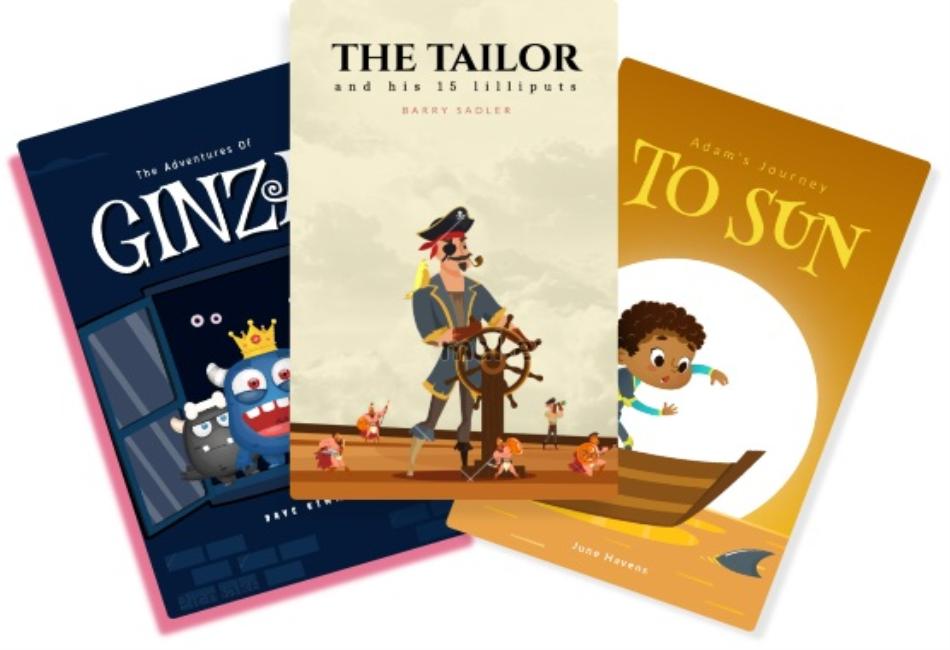While self-publishing or getting ready for a professional book release, one important element that makes a difference in a book’s presentation is a book cover creator. It doesn’t matter if you are a novelist, a non-fiction writer, or an academic publisher; having the ability to design appropriate and stylistically captivating genre covers can help in gaining an edge over many other books in digital and physical bookstores. This article focuses on understanding the concept of a book cover maker, efficient usage, and the best platforms available, alongside tips, examples, and answers to commonly asked questions.
What is a Book Cover Maker?
A book cover maker is an online or software-based tool that allows users to design professional-looking book covers without needing extensive graphic design skills. Customizable templates, stock images, font libraries, drag-and-drop editors, and even AI-powered design suggestions can be part of these tools. Book cover makers help streamline the creative process, whether marketing through Kindle Direct Publishing, Smashwords, IngramSpark, or Personal Private Press.
Book Cover Maker Online Free
Are you an author who is financially constrained? Then, a free book cover maker can be a huge advantage. We offer Canva, Snappa, and Adobe Express, which provide free access to templates, images, and features. These platforms often have drag-and-drop, a wide array of royalty-free media, and perfect sizes for both print and eBook versions. A free book cover maker enables indie authors to design an attractive cover without the need to hire an expensive professional or purchase costly design software. While premium versions are offered, free versions provide sufficient features for beginners.

Book Cover Maker Free
A book cover maker free of charge does not always result in mediocrity. A lot of sites have decent plans with a wide selection of templates for different genres and user-friendly tools such as design and editing. Be it a fiction, self-help, or a children’s book, book cover maker free options will allow authors to explore a wide range of edits and styles. For authors venturing into the publishing world with the need to test different designs, these options present an optimal blend of ease-of-use and utility.
Book Cover Maker AI
Thanks to AI, there are new design tools that are a lot easier for writers and publishers. A book cover maker AI tool generates cover suggestions for a book’s title, genre, and even a description. These platforms use machine learning to process design trends and make suggestions for fonts, layouts, and color schemes that match the tone of the narrative. This can greatly reduce the time needed for cover design while ensuring the cover meets industry standards. A book cover maker AI solution can greatly help authors without design knowledge in achieving a polished cover.
Read Also: The Evolution of Making: From Sketch to Structures
AI Book Cover Maker
An AI book cover maker offers smart, data-driven design assistance that goes beyond simple templates. By leveraging book cover data, an AI-driven tool can design an up-to-date book cover that meets the standards of the market. This tool can design a cover by using book summaries and keywords to create words, images, and layouts for the cover. This tool can be an important resource for authors who self-publish and are focused on obtaining the latest design trends while being cost-efficient.
The Importance of Book Cover Maker
- First Impressions Matter: The cover of a book is its advertisement. It is the first to be seen by potential readers. A cover that is over-designed—or even if the book’s content is brilliant—will for sure turn off the readers.
- Cost Effective: An average self-advertised designer of book covers charges for their services. The market offers several book cover makers, giving more affordable options than the book design industry.
- Simplified Processes: Using modern cover makers nowadays, readers have the need to design book covers for their publications, and quite simply, anyone who has basic computer knowledge is able to do that since there is provided a step-by-step intro on every cover maker.
- Versatility: Most modern cover makers nowadays provide ease for the cover as well as back cover text and even offer to design the spine of the book, for which the user is able to do a layout change on the go.
Read Also: Yellow Book Covers
Let Us Explore Further
Here are a couple of reasons to keep in mind to checking on the bookmakers:
1. Existing Patterns to Work On
The patterns provided to a user fill the gap that their creativity didn’t fill. Different users work on different styles of almost every book to make their designs stand out.
2. Types of Letters
The book is an art by itself, but there are several letters every book cover maker provides, and in one single case, feel for every genre—hence the ease and selection of their headers.
3. Upload Option or Image Repository
Some sites provide access to stock images and illustrations for free or for a fee, while others allow users to upload their images.
4. 3D Mockup Generator
This feature converts a flat design into a 3-dimensional book that is useful for social media and marketing materials.
5. Print and E-Book Sizes
Make sure the printer can handle standard sizes like 6×9 inches for printing and 1600×2560 pixels for the eBook. The printer should also support CMYK and RGB colors.
Fostering Platforms for 2025 Book Cover Creation
Best Book Cover Designing Tools
- UITR and Book Cover Designing Resetting Tools
- Fostering Platforms for Book Covers and to Boost Your Marketing Backup
- Best Book Cover Designing Tools Versus Their Competitors
- Book Cover Best Platforms Versus Two Fostering Reference
- Best Versatile Book Cover Designing Tools
These are useful for:
- Clear printing and serving targets
- Reviewing book contents and editing text
- Smart, quick share with book creators from different platforms
- All sizes of adapting images, animated banners, and social media sharing
Top Recommended Tools
Canva
Pros:
- Community support with webinars
- Author spotlighted with features
- Branding templates for series branding
Cons:
- Pricier than competitors for full features
Adobe Express (Formerly Adobe Spark)
Pros:
- Adobe Stock and Creative Cloud integration
- High-level design features
Cons:
- Requires design skills for best results
Visme
Pros:
- Clean interactive design options
- Branding consistency and design quality
Cons:
- The free version has limited features
Read Also: Book Cover Template: A Step-By-Step Guide to Designing Your Own Book Cover
How to Use a Book Cover Maker Step-by-Step
- Pick a Template or Begin with a Blank Design
Filters by genre are available on most platforms. You can also start from scratch.
- Type the Title and Author
Place the title and the author’s name. Ensure typography matches the genre (e.g., serif fonts for horror, script fonts for romance).
- Place Illustrations
Use a background image or illustration that doesn’t overpower the text.
- Personalize Layout
Rearrange, align, and stylize elements for visual appeal using color contrast or shadow.
- Save the Design
Export in the correct format, making sure to account for bleed areas when printing.
Utilizing Book Cover Generators with AI Technology
New tools that utilize AI allow users to insert a title or summary to auto-generate a fitting book cover. Tools like Designs.ai and Looka offer these features. Though not always perfect, they provide a solid base for customization.

Mistakes to Not Make When Designing a Book Cover
- Low Quality Images: Always use at least 300 dpi for printing.
- Genre Mismatch: Thriller covers should not look like travel memoirs.
- Bad Color Choices: Ensure legibility with proper contrast.
- Lack of Originality: Avoid templates that look generic. Customize thoroughly.
Genre-Specific Design Tips
- Romance: Light colors, flowing fonts, intimate imagery
- Science Fiction: Cosmic backgrounds, metallic tones, futuristic fonts
- Thriller: Dark colors, bold typography, minimalist design
- Self-Help: Bright colors, clean layout, readable fonts
Your book cover maker should offer flexible templates and editing tools to meet these genre requirements.
When to Hire a Designer Instead
A professional designer may be preferable when:
- Your budget is substantial
- You’re involved in a traditional publishing campaign
- Your book requires custom illustrations or branding
- You’re launching a series with consistent branding
Use a book cover maker to mock up ideas before working with a designer.
Common Questions About Book Cover Makers
Q1: Is there a cost for using book cover makers?
Most platforms offer free tiers. Canva is free with optional upgrades; BookBrush and Visme may require subscriptions.
Q2: Can I design covers for print and eBooks?
Yes, quality book cover makers support both, including spine and back cover for print editions.
Q3: What resolution should my cover be?
Print: 300 dpi (CMYK) | eBook: 72–300 dpi (RGB), 1600×2560 pixels
Q4: Is using a book cover maker unprofessional?
Not at all. Many successful indie authors use them effectively.
Q5: Can I sell books with Canva-made covers?
Yes, but be mindful of licensing on stock images and fonts used.
Q6: What goes on the back cover?
Include a summary/blurb, author bio and photo, ISBN barcode, and publisher logo (if applicable).
Q7: Can I use the same design style across a book series?
Yes, it’s encouraged for branding. Use a consistent layout, vary colors and imagery.
Last Notes
Having a book cover maker can be a wonderful addition to your self-publishing journey. With it, you gain affordability, speed, and creative control—everything an indie author or first-time publisher may need. With the right tool, some inspiration, and attention to genre-specific design principles, you can produce a cover that draws in readers and visually complements your story.
Allow your imagination to freely flow and your book cover maker to function as the tool that will bring your thoughts to life.




